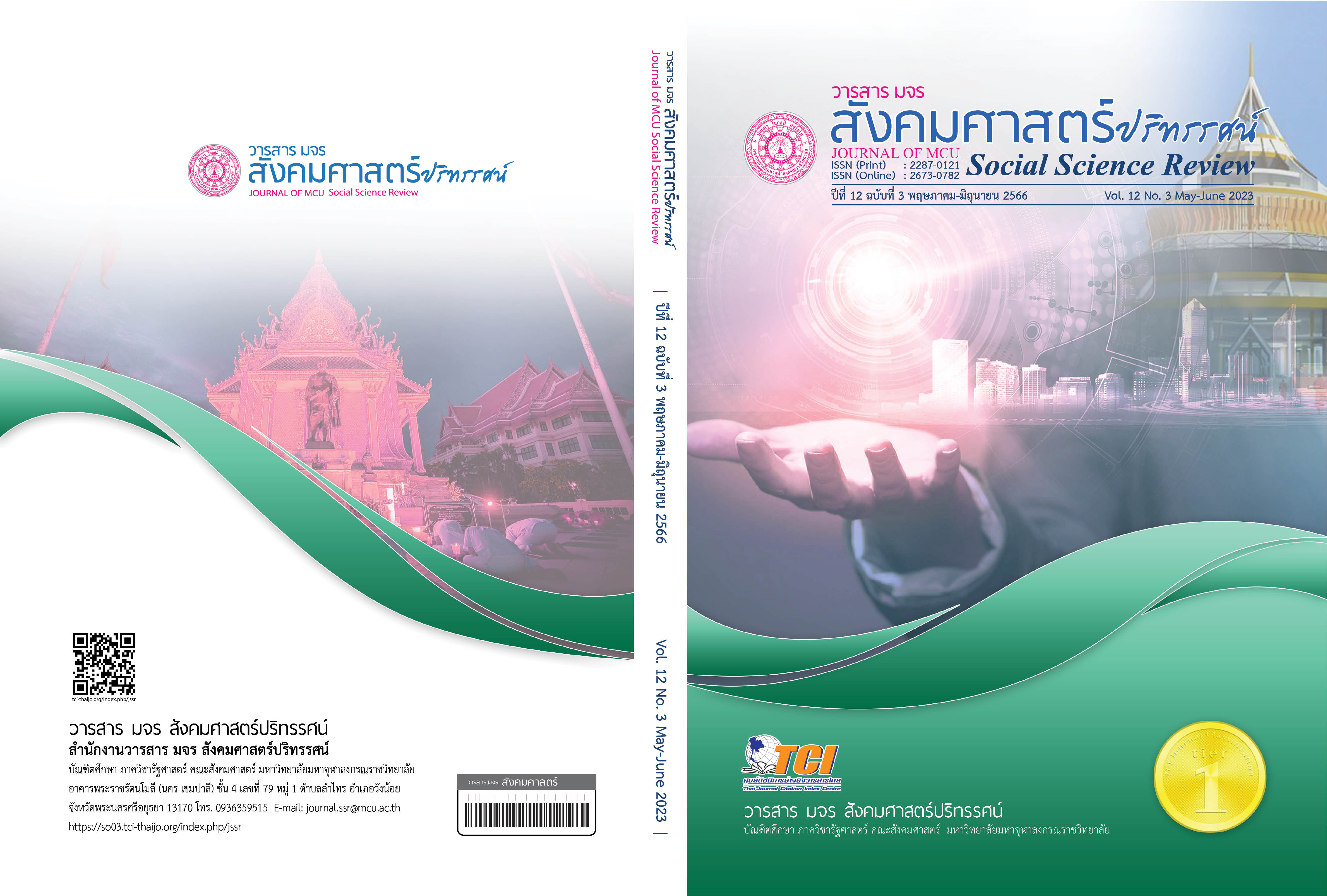แนวทางการประยุกต์ใช้หลักธรรมมาภิบาลเพื่อการบริหารกิจการคณะสงฆ์ ของพระสังฆาธิการในเขตจังหวัดพระนครศรีอยุธยา
คำสำคัญ:
ธรรมมาภิบาล, กิจการคณะสงฆ์, พระสังฆาธิการบทคัดย่อ
บทความวิจัยนี้มีวัตถุประสงค์ 1. เพื่อศึกษาสภาพทั่วไปในการปกครองคณะสงฆ์ 2. เพื่อศึกษากระบวนการในการประยุกต์หลักธรรมาภิบาล 3. เพื่อนำเสนอรูปแบบการประยุกต์หลักธรรมาภิบาล โดยมีระเบียบวิจัยเป็นเชิงคุณภาพเก็บข้อมูลจากผู้ให้ข้อมูลสำคัญจำนวน 30 รูปหรือคน ด้วยวิธีการสัมภาษณ์เชิงลึก วิเคราะห์ข้อมูลด้วยการพรรณนาความ
ผลการศึกษาพบว่า 1. จากสภาพปัญหาทั่วไปจึงเป็นเหตุให้ภาครัฐและสภาบันทางสังคมต่าง ๆ ออกมาเรียกร้องให้มีการใช้ระบบการบริหารจัดการแบบธรรมาภิบาล ด้วยเหตุนี้ สำนักงานคณะกรรมการข้าราชการพลเรือนจึงได้ออกระเบียบกำหนดหลักธรรมาภิบาล เพื่อเป็นแนวทางหรือขั้นตอนและรูปแบบขององค์ประกอบการบริหารงานของคณะสงฆ์ ทั้งนี้จะเห็นว่าหลักธรรมาภิบาลดังกล่าวได้กลายเป็นเกณฑ์มาตรฐานทางสังคม เป็นหลักประกันความอุ่นใจว่าปัญหาสภาพเศรษฐกิจจะไม่เกิดขึ้นอีก 2. กระบวนการในการประยุกต์ใช้หลักธรรมมาภิบาลเพื่อการปกครองคณะสงฆ์ ระบบอุปัชฌาย์อาจารย์ เป็นรูปแบบการบริหารโดยอำนาจของคณะสงฆ์เป็นสำคัญ นั่นคือ ใช้พระธรรมวินัยเป็นระบบกฎเกณฑ์ 3. ในการนำเสนอรูปแบบการประยุกต์หลักธรรมาภิบาลเพื่อการปกครองคณะสงฆ์นั้น เพื่อการสร้างความสัมพันธ์ร่วมกันระหว่างคณะสงฆ์ ประชาชน
เอกสารอ้างอิง
พระครูวิมลสุวรรณกร (สมพงษ์ จนฺทวโร). (2559). รูปแบบการปกครองคณะสงฆ์ที่พึงประสงค์ของพระสังฆาธิการในเขตการปกครองคณะสงฆ์ภาค 1 (วิทยานิพนธ์พุทธศาสตรดุษฎีบัณฑิต สาขาการ จัดการเชิงพุทธ). พระนครศรีอยุธยา: มหาวิทยาลัยมหาจุฬาลงกรณราชวิทยาลัย.
พระครูพิศิษฏ์ประชานาถ (ประยูร นนฺทิโย). (2563). การพัฒนาการมีส่วนร่วมของพระสงฆ์ ในการพัฒนาชุมชนตามแนววิถีพุทธในจังหวัดสมุทรสงคราม วารสาร มจร สังคมศาสตร์ปริทรรศน์, 9(1), 23-36.
สมชาติ โตรักษา. (2553). การประยุกต์หลักการบริหาร เพื่อการพัฒนางานอย่างต่อเนื่อง(รายงานการวิจัย). กรงเทพฯ: สำนักงานคณะกรรมการวิจัยแห่งชาติ.
ภูสิทธ์ ภูคำชะโนด. (2562). การพัฒนาชุมชนวิถีประชาธิปไตยตามหลักธรรมาภิบาล: หลักความโปร่งใส ของประชาชนในพื้นที่เขตดุสิต กรุงเทพมหานคร. วารสาร มจร สังคมศาสตร์ปริทรรศน์, 8(4), 278-293.
ถนัด ไชยพันธ์ และคณะ. (2556). การประยุกต์ใช้หลักพุทธธรรมเพื่อการส่งเสริมประสิทธิผลในการบริหารงานขององค์กรปกครองส่วนท้องถิ่นจังหวัดอุบลราชธานี. วารสาร มจร สังคมศาสตร์ปริทรรศน์, 7(3), 76-89.
กรรมการมูลนิธิมหามงกุฎราชวิทยาลัย. (2521). ลักษณะการปกครองคณะสงฆ์ไทยโดยสังเขปในประวัติการปกครองคณะสงฆ์ไทย. กรุงเทพฯ: โรงพิมพ์มหามงกุฎราชวิทยาลัย.
ดาวน์โหลด
เผยแพร่แล้ว
รูปแบบการอ้างอิง
ฉบับ
ประเภทบทความ
สัญญาอนุญาต
ลิขสิทธิ์ (c) 2023 วารสาร มจร สังคมศาสตร์ปริทรรศน์

อนุญาตภายใต้เงื่อนไข Creative Commons Attribution-NonCommercial-NoDerivatives 4.0 International License.
เพื่อให้เป็นไปตามกฎหมายลิขสิทธิ์ ผู้นิพนธ์ทุกท่านต้องลงลายมือชื่อในแบบฟอร์มใบมอบลิขสิทธิ์บทความให้แก่วารสารฯ พร้อมกับบทความต้นฉบับที่ได้แก้ไขครั้งสุดท้าย นอกจากนี้ ผู้นิพนธ์ทุกท่านต้องยืนยันว่าบทความต้นฉบับที่ส่งมาตีพิมพ์นั้น ได้ส่งมาตีพิมพ์เฉพาะในวารสาร มจร สังคมศาสตร์ปริทรรศน์ เพียงแห่งเดียวเท่านั้น หากมีการใช้ภาพหรือตารางหรือเนื้อหาอื่นๆ ของผู้นิพนธ์อื่นที่ปรากฏในสิ่งตีพิมพ์อื่นมาแล้ว ผู้นิพนธ์ต้องขออนุญาตเจ้าของลิขสิทธิ์ก่อน พร้อมทั้งแสดงหนังสือที่ได้รับการยินยอมต่อบรรณาธิการ ก่อนที่บทความจะได้รับการตีพิมพ์ หากไม่เป็นไปตามข้อกำหนดเบื้องต้น ทางวารสารจะถอดบทความของท่านออกโดยไม่มีข้อยกเว้นใดๆ ทั้งสิ้น





